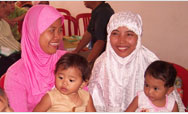 |
|
 |
 |
|
 |
 |
 |
| USAID Information:
External Links:
|
|
 |
 |
|
Economic Opportunity Replaces Conflict in Iraq
FOR IMMEDIATE RELEASE
May 9, 2008
Press Office: 202-712-4320
Public Information: 202-712-4810
www.usaid.gov
BALAD, IRAQ - The U.S. Agency for International Development's (USAID) Agribusiness Program, 'Inma,' is leading the way to economic recovery in the city of Balad, 50 miles north of Baghdad. A $5 million grant to restart operations at the Balad Canning Factory (BCF) is part of a larger regional project that will help restore agricultural and agribusiness operations throughout this formerly strife-torn area.
BCF, one of Iraq's largest food processors, was built in 1974 as a government-owned tomato paste factory. After privatization, the owners added ten product lines to their operations that employed over 1000 Sunni and Shia workers, including up to 200 women. The factory's demand for agricultural supplies not only kept local farmers producing and profiting, it also bought produce from some 50 wholesale suppliers in the provinces of Diyala, Salah ad Din, Baghdad, Anbar, Babil, Mosul, and Erbil. BCF's outputs created still further employment for transportation companies and for more than thirty wholesale buyers throughout Iraq.
USAID has long recognized the importance of Iraq's food and agriculture sector. A 2006 USAID report, The Potential for Food Processing in Iraq, stated "…the food and agriculture sector may contribute as much as $10 billion to Iraq's GDP, assuming that Iraq can achieve levels of agricultural production per capita that are in keeping with regional levels, and can establish a food processing industry…" Inma's mandate is to strengthen entire "value chains" in the agriculture and agribusiness sector, including production, handling, processing and marketing.
BCF's potential for food processing was shattered in October 2006 when the entire surrounding area erupted in sectarian violence; farmers were unable to work their fields and the factory no longer had access to the agricultural supplies required to operate. Not only were factory workers suddenly unemployed, tens of thousands of farmers found themselves similarly destitute.
It wasn't until mid-2007 that efforts by Coalition and Iraqi Security Forces ended the violence in the area. Engagement with the community began by bringing the various sectarian factions to the table where they all recognized a common goal - economic development could ensure continued peace. Engineers from USAID's Inma program undertook an extensive assessment of BCF's 10-hectare facility and drew up plans to bring at least some of the plant's operations back on line.
Inma's grant funding will ensure that power, water, waste treatment and steam are restored to the plant. The latter is key to processing tomato paste, sesame butter, and date syrup, items that demand huge quantities of locally grown products. Lines requiring the least amount of renovation and steam - chips, bottled water and fruit-flavored drinks - are expected to go on line by mid-2008. These product lines will employ up to 200 workers.
When rehabilitation is complete and all production lines are on-line, BCF will have a permanent workforce of approximately 1,200 workers. The plant will process close to 20,000 tons - $30 million - worth of dates, tomatoes, sesame, wheat and corn produced from over 1,000 small farms.
By bringing workers together, BCF spells hope for sectarian reconciliation in the Balad community and creates a model for other Iraqi communities to follow.
For more information about USAID and its programs in Iraq, please visit www.usaid.gov.
The American people, through the U.S. Agency for International Development, have provided economic and humanitarian assistance worldwide for nearly 50 years.
Back to Top ^
|


